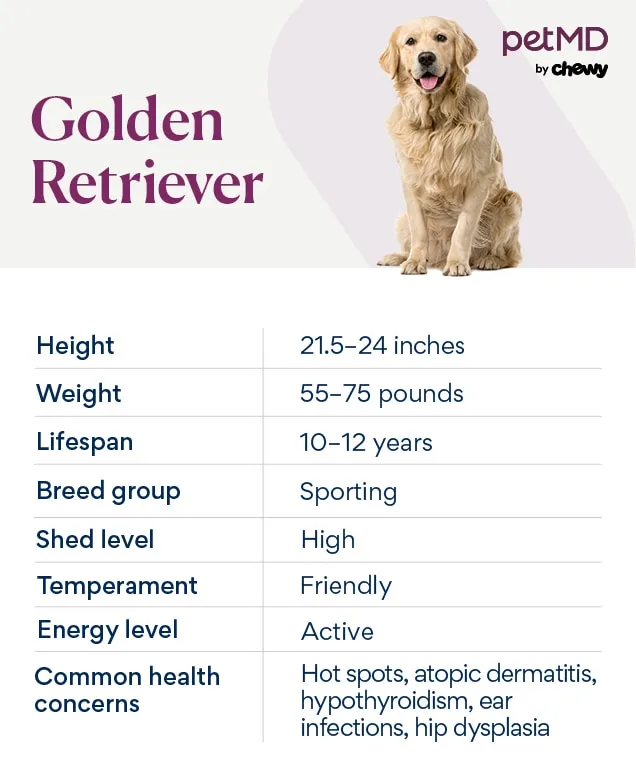Golden Retrievers, affectionately known as “Goldens,” are cherished for their intelligence, loyalty, and affectionate nature. These medium-sized sporting dogs, weighing between 55–75 pounds, are renowned for their beautiful, thick, water-repellent double coats and a love for outdoor activities like running, long walks, retrieving, and swimming. While these traits make them wonderful companions, they also increase their susceptibility to parasites such as fleas and ticks. A robust and effective flea and tick prevention strategy is paramount to protect your Golden Retriever from discomfort, skin issues, and potentially serious diseases. Choosing the Best Flea And Tick Medicine For Golden Retrievers requires careful consideration of various factors to ensure both efficacy and safety for your beloved pet.
Understanding Fleas and Ticks: A Threat to Golden Retrievers
Fleas and ticks are more than just an annoyance; they pose significant health risks to Golden Retrievers. Fleas can cause intense itching, allergic dermatitis, and can transmit tapeworms. Their relentless biting can lead to “hot spots,” localized areas of inflamed and infected skin, which Golden Retrievers are already prone to develop. Ticks, on the other hand, are vectors for debilitating diseases such as Lyme disease, Ehrlichiosis, Anaplasmosis, and Rocky Mountain spotted fever, among others. Given their double coat, which provides ample hiding spots, and their active, outdoor lifestyles, Golden Retrievers are at a higher risk of encountering these parasites, making year-round protection essential.
Factors to Consider When Choosing Flea and Tick Medicine for Your Golden Retriever
Selecting the appropriate flea and tick prevention for your Golden Retriever involves evaluating several key factors tailored to their unique needs and your specific environment.
Age and Weight
Flea and tick medications are dosed based on a dog’s age and weight. It is crucial to use a product specifically formulated for your Golden Retriever’s current life stage (puppy, adult, or senior) and within their weight range to ensure both effectiveness and safety. Using an incorrect dosage can be ineffective or, worse, harmful.
Lifestyle and Environment
A Golden Retriever’s lifestyle greatly influences the type of protection needed. If your dog spends a lot of time outdoors, particularly in wooded areas, tall grass, or dog parks, they will require a more comprehensive and potent preventative. For Goldens who love to swim, waterproof or oral medications might be more suitable than topical treatments, which can be washed off. Understanding the prevalence of fleas and ticks in your geographic location is also vital, as some regions have higher parasite loads or specific tick species that carry particular diseases.
Existing Health Conditions
Golden Retrievers are predisposed to certain health issues, including atopic dermatitis (environmental allergies) and sensitive skin, which can be exacerbated by flea bites. If your Golden has known allergies, skin sensitivities, or other medical conditions like hypothyroidism or heart problems, discussing prevention options with your veterinarian is critical. They can recommend products less likely to cause adverse reactions or interact with existing medications.
Active Ingredients and Formulation Preference
Different medications utilize various active ingredients to kill or repel parasites. These can include isoxazolines (e.g., fluralaner, sarolaner, afoxolaner), fipronil, permethrin, or selamectin. Each ingredient has a different mode of action and spectrum of activity. The formulation also matters:
- Oral Medications: Administered as a chewable tablet, these are often convenient, not affected by bathing or swimming, and provide systemic protection. They require the flea or tick to bite the dog to be effective.
- Topical Treatments (Spot-Ons): Applied to the skin, typically between the shoulder blades, these spread over the dog’s skin and hair. They are generally easy to apply but may require a waiting period before bathing and can sometimes leave a residue.
- Flea and Tick Collars: Designed to release active ingredients over time, some offer long-lasting protection. However, their effectiveness can vary, and some dogs may experience skin irritation under the collar or lose the collar during play.
Types of Flea and Tick Medications for Golden Retrievers
When evaluating the best flea and tick medicine for Golden Retrievers, it’s helpful to understand the primary categories of products available and their general characteristics.
Oral Flea and Tick Medications
Oral medications are a popular choice for many Golden Retriever owners due to their ease of administration and consistent protection. These chewable tablets are absorbed into your dog’s bloodstream, killing fleas and ticks when they bite.
- Pros: Highly effective, not affected by water (swimming or bathing), convenient monthly or quarterly dosing, provide full-body protection, and generally safe when used as directed. Many also offer protection against internal parasites.
- Cons: Require the parasite to bite the dog to ingest the active ingredient, potential for gastrointestinal upset in some dogs, and require a prescription from a veterinarian.
- Examples: Common active ingredients include afoxolaner, fluralaner, sarolaner, and lotilaner. These compounds are known for their rapid onset of action and prolonged efficacy.
Topical (Spot-On) Flea and Tick Treatments
Spot-on treatments are applied directly to the skin, typically at one or more spots along the back, and the active ingredients spread across the skin’s surface and into the hair follicles.
- Pros: Easy to apply at home, some formulations offer repellency in addition to killing parasites, and they can be found over-the-counter or with a prescription.
- Cons: Can be less effective if the dog swims frequently or is bathed often, requires careful application to avoid ingestion or contact with children/other pets, and some dogs may experience skin irritation at the application site.
- Examples: Products containing fipronil, permethrin (use with caution around cats), or selamectin are common.
Flea and Tick Collars
Modern flea and tick collars are a significant improvement over older versions, often incorporating advanced technology to release active ingredients effectively over several months.
- Pros: Long-lasting protection (often up to 8 months), relatively easy to apply once, and can be an option for dogs where oral or topical treatments are challenging.
- Cons: May not provide uniform coverage over the entire body, can cause localized skin irritation, and there’s a slight risk of entanglement or ingestion if the dog chews on it. Ensure the collar fits snugly but comfortably.
- Examples: Collars utilizing flumethrin and imidacloprid are known for their extended efficacy.
Shampoos, Dips, and Sprays
These products typically offer immediate, but short-lived, relief from fleas and ticks. They are generally used for initial knockdown of an existing infestation rather than long-term prevention.
- Shampoos and Dips: Kill parasites on contact but have no residual effect once rinsed.
- Sprays: Can offer more targeted or longer-lasting protection than shampoos, but efficacy depends on thorough application and can still be temporary.
- Recommendation: While useful for acute infestations, these should always be combined with a veterinarian-approved, long-term preventative for comprehensive protection.
Top-Rated Flea and Tick Medicine Options for Golden Retrievers
When seeking the best flea and tick medicine for Golden Retrievers, veterinary recommendation is always the gold standard. Veterinarians can offer tailored advice based on your dog’s specific health profile, local parasite risks, and your family’s lifestyle. Many highly effective products are available, often requiring a prescription due to their potency and safety profiles.
Look for products that offer:
- Broad-Spectrum Protection: Ideally, choose a treatment that targets both fleas and ticks, and potentially other parasites like heartworms or intestinal worms, as part of a comprehensive preventative plan. For an effective monthly flea and tick treatment for dogs, consult your vet for the best prescription option.
- Rapid Kill Time: Medications that kill fleas and ticks quickly minimize discomfort for your Golden Retriever and reduce the risk of disease transmission.
- Long-Lasting Efficacy: Monthly oral or topical treatments, or long-duration collars, provide consistent protection without frequent reapplication.
- Safety Profile: Products with a strong safety record for the Golden Retriever breed, especially considering their predisposition to skin sensitivities and certain health conditions, are preferred. Always discuss potential side effects with your vet.
Preventing Flea and Tick Infestations: Beyond Medication
While medication is a cornerstone of prevention, a holistic approach is most effective for Golden Retrievers.
Regular Grooming and Inspection
Golden Retrievers’ dense double coats require consistent grooming to keep them healthy. Brush your dog at least once or twice a week to reduce shedding and prevent matting, especially behind the ears and on the hind limbs. During these grooming sessions, thoroughly inspect their skin and coat for any signs of fleas (flea dirt, live fleas) or ticks, particularly after outdoor excursions. Early detection can prevent major infestations.
 A breed chart depicting a golden retriever, highlighting its physical characteristics and typical coat color.
A breed chart depicting a golden retriever, highlighting its physical characteristics and typical coat color.
Environmental Control
Fleas and ticks don’t just live on your dog; they can infest your home and yard. Regularly vacuuming carpets, rugs, and upholstery can help remove flea eggs and larvae. If you have a yard, consider treating it with pet-safe insecticides or using natural deterrents, especially during peak parasite seasons. Keeping grass mowed short and clearing leaf litter can also reduce tick habitats.
Veterinary Check-ups
Routine veterinary visits are crucial for monitoring your Golden Retriever’s overall health, including their skin health. Your vet can advise on the most current and effective flea and tick prevention strategies for your region and help manage any skin issues like hot spots or atopic dermatitis, which can be exacerbated by parasite bites.
Common Health Issues in Golden Retrievers
Golden Retrievers typically have a lifespan of 10–12 years and are generally healthy dogs. However, due to genetic predispositions and sometimes poor breeding practices, they can develop certain health issues. Regular screenings and diligent care are vital.
Musculoskeletal Conditions
- Hip Dysplasia: An inherited condition where the hip joint is malformed, leading to pain and arthritis. Symptoms include lameness, slowness to rise, and a “bunny-hopping” gait. Weight management, diet, exercise, and joint supplements can help manage it, but severe cases may require surgery. For managing joint pain, understanding pain medication for hip dysplasia in dogs is crucial.
- Elbow Dysplasia: A group of inherited orthopedic conditions causing degenerative joint disease in the elbow. Diagnosis involves X-rays or CT scans, with treatment ranging from joint injections to surgery and anti-inflammatory and pain medications. Finding the right pain medicine for dogs with hip dysplasia and elbow issues is vital for their quality of life.
Skin Conditions
- Hot Spots: Localized inflamed and infected skin areas, often bacterial or yeast-based. They frequently develop from excessive scratching due to underlying allergies or flea bites. These resolve with medication and treating the root cause.
- Atopic Dermatitis (Atopy): An inflammatory and itchy skin condition triggered by environmental allergens like pollen, dust mites, or mold, to which Golden Retrievers are predisposed. Symptoms include scratching, chewing, licking, hair loss, and ear infections.
 A golden retriever hiding under a warm blanket in a human bed, illustrating comfort and pet-owner bond.
A golden retriever hiding under a warm blanket in a human bed, illustrating comfort and pet-owner bond.
Endocrine Disorders
- Hypothyroidism: An endocrine disorder where the thyroid gland doesn’t produce enough hormones. Common in middle-aged Goldens, symptoms include weight gain, decreased energy, recurring skin infections, thinning fur, and dry skin. It’s managed with lifelong medication.
Cancers and Heart Problems
Golden Retrievers can be prone to various cancers, including lymphoma and hemangiosarcoma. They are also susceptible to inherited heart conditions like Subaortic Valvular Stenosis (SAS), where fibrous tissue obstructs blood flow, leading to heart damage. Responsible breeding practices are key to prevention.
Other Essential Care Tips for Your Golden Retriever
Beyond parasite prevention and managing specific health issues, comprehensive care ensures a happy and healthy Golden Retriever.
Nutrition
Golden Retriever puppies require a large-breed, high-quality puppy formula until 12–18 months, transitioning to an adult large-breed diet afterward. Always choose AAFCO-compliant foods and consult your veterinarian for the best options. Full-grown Goldens thrive on twice-daily feedings, while puppies need 3-4 meals daily. Due to their love for food, a slow feeder bowl or interactive food puzzle can prevent fast eating and associated digestive issues. Always monitor their body condition score to prevent overfeeding, which can exacerbate joint problems.
Exercise and Mental Stimulation
Golden Retrievers have moderate to high energy levels throughout their lives. They need daily physical exercise, such as running, long walks, and swimming. As one of the smartest dog breeds, they also require significant mental stimulation to prevent boredom, which can lead to undesirable behaviors like excessive chewing or digging. Puzzle toys, training sessions, and interactive games are excellent ways to keep their minds engaged.
 A golden retriever sitting calmly at golden hour, showcasing its serene and gentle nature.
A golden retriever sitting calmly at golden hour, showcasing its serene and gentle nature.
Training and Socialization
Goldens are eager to please and intelligent, making them relatively easy to train, even for first-time pet parents. Positive reinforcement methods are most effective. Early and consistent socialization from puppyhood is vital to ensure they grow into well-adjusted, confident, and well-behaved adults, friendly with children, other pets, and strangers. This also helps them cope with new situations and experiences gracefully.
 A golden retriever puppy smiling, capturing its friendly and endearing personality.
A golden retriever puppy smiling, capturing its friendly and endearing personality.
Grooming Beyond the Coat
While coat care is essential for their double coat, don’t forget other grooming aspects:
- Skin Care: Regular checks help detect hot spots or other issues. Hypoallergenic shampoos can reduce allergen exposure for Goldens prone to atopy.
- Eye Care: Mild tear staining is common and can be managed with vet-approved removers.
- Ear Care: Goldens are susceptible to ear infections. Clean their ears every 2-3 weeks, and after swimming or bathing, using a product with a drying agent like Epi-Otic® Advanced, as recommended by your vet.
Conclusion
Protecting your Golden Retriever from fleas and ticks is a critical component of their overall health and well-being. Their beautiful double coat and love for the outdoors make them particularly vulnerable to these parasites, which can lead to uncomfortable skin conditions and severe diseases. By carefully considering factors like age, weight, lifestyle, and existing health conditions, and by consulting with your veterinarian, you can select the best flea and tick medicine for Golden Retrievers that offers robust and safe protection. Remember that a comprehensive approach, combining medication with diligent grooming, environmental control, and regular vet check-ups, is the most effective strategy. Providing this level of dedicated care ensures your Golden Retriever remains a happy, healthy, and cherished member of your family for years to come.
